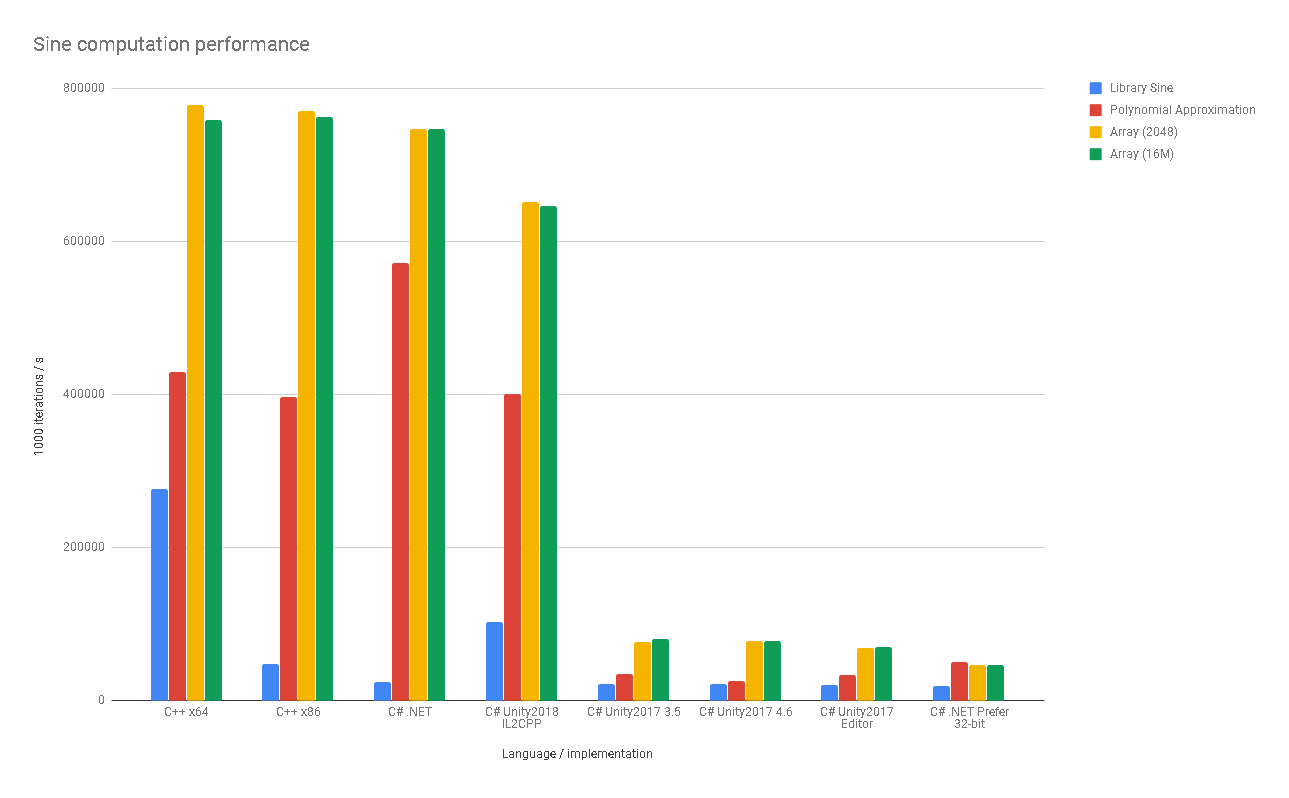This file documents a series of tests for different approaches to sine computation, the goal being to test the relative performance of different approaches to DSP code for use in Unity. This is relevant for anyone who wants to write realtime software synthesizers and effects for Unity games. The example used is a simple algorithm that computes a sum of sines using different approaches: library functions, polynomial approximation, and lookup tables of different sizes.
The key result of the tests was:
C# in Unity with the IL2CPP scripting backend performs comparably to C++,
which indicates that C# could be viable for implementing DSP code.
The following graph shows the performance of 4 different sine computation algorithms (lookup tables are the fastest), implemented using C++ and C# with different scripting backends.
In Unity PlayerSettings, the IL2CPP scripting backend is enabled here:
- The same algorithms are being tested with C# and C++ implementations, detailed below.
- Tests run 144000000 iterations and are timed with
StopWatch(C#) orchrono::high_resolution_clock(C++). - C++ code is compiled with VS2017 in Release mode with optimization enabled
- .NET C# code is compiled with VS2017 in Release mode with optimization enabled
- 'Unity2017' means compiled with Unity 2017.2.0f3 (64-bit)
- Unity2017-Editor is running in editor (Mono)
- Unity2017-3.5 is Unity standalone with Scripting Runtime Version is set to '.NET 3.5 equivalent' (Mono)
- Unity2017-4.6 is Unity standalone with Scripting Runtime Version is set to '.NET 4.6 equivalent' (Mono)
- 'Unity2018-IL2CPP-4.x' means Unity2018.2.5f1 standalone, Backend: IL2CPP, .NET 4.x Equivalent, .NET 4.x, Compiled in Visual Studio 2017, 'Release' build, - 'Master' did not have any significant increase in performance.
- All tests were run on an Intel Core i7-6700HQ 2.60 GHz.
- C++, C# (.NET), and C# compiled with Unity's IL2CPP perform comparably, other Unity C# scripting backends and .NET with the 'Prefer 32-bit' option enabled perform much worse, in most tests by an order of magnitude.
- The fastest tested approach to sine computation was a look-up table (LUT). Tables with 2K to 16M floats performed equally well. This came as a bit of a surprise, since the i7-6800HQ only has 6 MB of cache.
- C# (.NET) outperforms C# (Unity) by a factor of 1.2-17, depending on the test type, however, according to official Unity forum posts, .NET is deprecated in favour of Mono and IL2CPP.
- If 'Prefer 32-bit' is enabled in VS2017, C# performs very poorly, up to 16x slower.
Code:
float sum = 0.0f;
float angle_per_iteration = PI2 / iterations;
for (long i = 0; i < iterations; ++i) {
float angle = i * angle_per_iteration;
// C++ uses sinf(), C# uses (float)Math.Sin()
sum += SIN(angle); // make sure that code isn't optimized away
}
Results (144000000 iterations):
- C++ (x86) : 48528 K iter/s
- C++ (x64) : 275856 K iter/s !
- C# (Unity2017-3.5) : 21216 K iter/s
- C# (Unity2017-4.6) : 21264 K iter/s
- C# (Unity2017-Editor) : 20400 K iter/s
- C# (.NET) : 24048 K iter/s
- C# (.NET Prefer 32-bit) : 18624 K iter/s
- C# (Unity2018-IL2CPP-4.x) : 102345 K iter/s
Code:
float sum = 0.0f;
const float periods_per_iteration = 1.0f / iterations;
const float F = -8.0f * PI;
for (long i = 0; i < iterations; ++i) {
float p = i * periods_per_iteration;
// C++ uses abs, C# uses Math.Abs
float sine = 8 * p + F * p * ABS(p * PI2);
sum += sine;
}
Results (144000000 iterations):
- C++ (x86) : 396672 K iter/s
- C++ (x64) : 429840 K iter/s
- C# (Unity2017-3.5) : 34416 K iter/s
- C# (Unity2017-4.6) : 25920 K iter/s
- C# (Unity2017-Editor) : 33072 K iter/s
- C# (.NET) : 571440 K iter/s !
- C# (.NET Prefer 32-bit) : 51168 K iter/s
- C# (Unity2018-IL2CPP-4.x) : 401114 K iter/s
Code::
// C++ uses 'float *', C# uses 'float[]'
FLOAT_ARRAY sine = new float[TABLE_SIZE];
float sum = 0.0f;
const float periods_per_iteration = 1.0f / iterations;
for (long i = 0; i < iterations; ++i)
{
float periods = i * periods_per_iteration;
int idx = periods * TABLE_SIZE;
sum += sine[idx];
}
Results (144000000 iterations, TABLE_SIZE=2048)
- C++ (x86) : 770016 K iter/s
- C++ (x64) : 778368 K iter/s !
- C# (Unity2017-3.5) : 76224 K iter/s
- C# (Unity2017-4.6) : 77472 K iter/s
- C# (Unity2017-Editor) : 68880 K iter/s
- C# (.NET) : 746112 K iter/s
- C# (Prefer 32-bit) : 46848 K iter/s
- C# (Unity2018-IL2CPP-4.x) : 651584 K iter/s
Results (144000000 iterations, TABLE_SIZE=16M)
- C++ (x86) : 761904 K iter/s !
- C++ (x64) : 757872 K iter/s
- C# (Unity2017-3.5) : 80736 K iter/s
- C# (Unity2017-4.6) : 77472 K iter/s
- C# (Unity2017-Editor) : 69984 K iter/s
- C# (.NET) : 746112 K iter/s
- C# (.NET Prefer 32-bit) : 46416 K iter/s
- C# (Unity2018-IL2CPP-4.x) : 645740 K iter/s
- For the Array Test at least, the C++ binary is SSE optimized:
// Array Test inner loop:
float periods = i * periods_per_iteration;
00007FF62B02C8BE cvtsi2ss xmm0,dword ptr [rbp+44h]
00007FF62B02C8C3 mulss xmm0,dword ptr [periods_per_iteration]
00007FF62B02C8C8 movss dword ptr [rbp+64h],xmm0
int idx = periods * table_size;
00007FF62B02C8CD mov rax,qword ptr [this]
00007FF62B02C8D4 cvtsi2ss xmm0,dword ptr [rax+38h]
00007FF62B02C8D9 movss xmm1,dword ptr [rbp+64h]
00007FF62B02C8DE mulss xmm1,xmm0
00007FF62B02C8E2 movaps xmm0,xmm1
00007FF62B02C8E5 cvttss2si eax,xmm0
00007FF62B02C8E9 mov dword ptr [rbp+84h],eax
sum += sine[idx];
00007FF62B02C8EF movsxd rax,dword ptr [rbp+84h]
00007FF62B02C8F6 mov rcx,qword ptr [this]
00007FF62B02C8FD mov rcx,qword ptr [rcx+40h]
00007FF62B02C901 movss xmm0,dword ptr [sum]
00007FF62B02C906 addss xmm0,dword ptr [rcx+rax*4]
00007FF62B02C90B movss dword ptr [sum],xmm0

